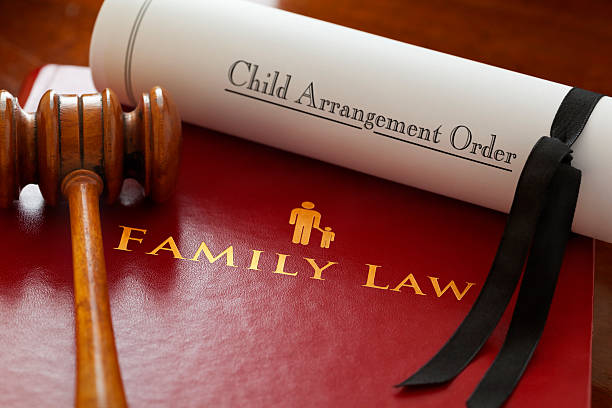Family court—two words that can evoke a mix of emotions. From anxiety to hope, the process can feel overwhelming, especially when fairness is a primary concern. What methods does a family court judge employ to ensure fairness in Texas family law cases? What can you expect when going through this often-stressful experience? This post tackles these questions, giving you a clearer picture of how procedural fairness plays out in Texas family courts.
Going through a family law case can feel like stepping into the unknown. You might be uncertain about what to expect or if the judge will listen. We’ll break down the core methods, principles, and Texas legal requirements used in family courts to strive for fair outcomes. Understanding these legal services can provide a roadmap for navigating family law in Texas.
Understanding Fairness in Family Court
“Fairness” in family court isn’t about determining right from wrong or assigning blame. Instead, judges consider the best interests of everyone involved, especially children. They rely on guiding legal principles from the Texas Family Code.
These principles prioritize the child’s physical and emotional well-being, parental fitness, and parent-child relationship opportunities. Child custody decisions exemplify how courts consider various factors affecting children.

Impartiality and Due Process: Cornerstones of Fairness
Judges must act impartially, avoiding biases based on personal opinions, relationships, or external pressures. Due process is crucial. This includes the right to legal representation, the opportunity to present evidence and witnesses, and the ability to challenge opposing arguments.
Although court cases have decreased after the Covid-19 pandemic, the number of case filings remains significant. These filings demand procedural fairness. Maintaining these steps helps create a level playing field for each party to be heard.
Methods Judges Use to Ensure Fairness
Navigating family law often requires understanding the various processes. Texas family court judges use specific strategies to maintain balance and objectivity. Let’s explore, “what methods does a family court judge employ to ensure fairness in Texas family law cases?
Evidence-Based Decision-Making
Judges base rulings on presented evidence, not hearsay or speculation. They examine financial records, witness testimonies, expert opinions, and other verifiable information. Family Law Act rulings highlight this evidence-driven process.
Personal feelings carry less weight than hard evidence. Texas courts prioritize objective data from third-party financial experts. These experts may have experience with complex financial matters like property division and probate legal services.
Rules of Evidence and Procedure
Rules of evidence dictate how proof is admitted and evaluated. Established procedures outline each step of the case. This provides both sides a fair chance to prepare and engage with the system.
Consider seeking help with family law matters to gain understanding and support. You can explore options like temporary orders or protective services for additional legal guidance.
Alternative Dispute Resolution (ADR)
Judges often encourage alternative dispute resolution (ADR), such as mediation or collaborative divorce. ADR allows for more personalized solutions and minimizes adversarial courtroom battles.
Mediation can help reach agreements on child support, visitation schedules, and property division. Divorce mediation offers advantages over adversarial processes, which may not fully address a family’s needs.
Mediation can also provide opportunities to discuss prenuptial agreements, spousal spying, and postnuptial agreements. This process encourages collaborative solutions for amicable outcomes, like in Texas divorce mediation.
Guardian ad Litem
In child custody or visitation disputes, judges may appoint a guardian ad litem (GAL). The GAL advocates solely for the child’s best interests. They offer unbiased recommendations based on independent assessments. Child protective services are sometimes involved in these cases.
Appointed Experts
In complex financial matters, like property division, judges might consult outside experts. These experts provide unbiased perspectives, simplifying issues for the judge and promoting fairness.
Estate planning FAQ and trust administration considerations may also require expert input.
Courtroom Conduct and Expectations
Courtrooms have codes of behavior. Politeness, respect for the judge, and truthful statements portray integrity and confidence. While personal grievances matter emotionally, family court focuses on factual data.
Cooperation is key for successful resolution. Fairness involves ensuring all viewpoints are expressed and reviewed calmly and structurally, prioritizing factual information over emotionally-driven opinions.
Texas divorce mediation promotes collaborative solutions. Seeking collaborative divorce options often leads to more satisfactory outcomes for families navigating legal processes.

Learn how Texas family court judges promote fairness with impartial rulings and child-centered approaches. Mediation and expert advocacy enhance equitable outcomes.
FAQs about Fairness in Family Court
What makes a good family court judge?
A good family court judge is impartial, knowledgeable about family law, and a strong communicator. They exhibit patience and compassion. Impartiality ensures unbiased decisions based on evidence.
In-depth legal knowledge ensures rulings align with standards and precedents. Clear communication helps families understand complex processes during emotionally challenging times.
How do judges make decisions in family court?
Judges analyze evidence from hearings, evaluate testimonies, and review documents. They might consult court-appointed professionals, like guardians ad litem or financial experts.
Divorce mediation can provide valuable information on topics such as spousal spying, prenuptial agreements, and postnuptial agreements. It can be valuable when dealing with matters such as probate with a judge’s order for distributing a small estate.
How do you win an appeal in family court?
Winning an appeal requires demonstrating a legal error, like improperly admitted evidence or misinterpretations of law. This differs from simply disagreeing with the judge’s findings.
You must show the error negatively impacted the outcome. Proving the correct application of law would significantly improve your case’s result is essential. You will also want to be familiar with the different practice areas and be ready with your rights ebook if there is drug possession or DWI/DUI charges. Your defense attorney and criminal defense attorney can further explain everything, and you can learn more from criminal law videos or from taking law videos classes and ondemand webinars.
How do I convince a judge in family court?
Be truthful, avoid drama, and adhere to court procedures. Support statements with facts and evidence. Submit all documentation promptly.
Understanding how judges handle similar disputes and family matters can improve your experience. Visitation modifications and property division enforcement also benefit from a detailed understanding of court proceedings. Knowing Texas criminal law or other Texas laws might help as well.

Conclusion
Family court judges strive for fairness using legal processes, objective evidence, and collaborative resolutions. While fairness is subjective, Texas courts follow procedures designed to provide a voice for everyone.
These methods aim to deliver fair judgments and achieve procedural equity in Texas family court. While navigating family law matters is often complex, understanding the procedures and having legal representation enhances your chances of a fair outcome. Consulting with a family law practice will benefit you if there is a need to have record expungement evaluation done.
